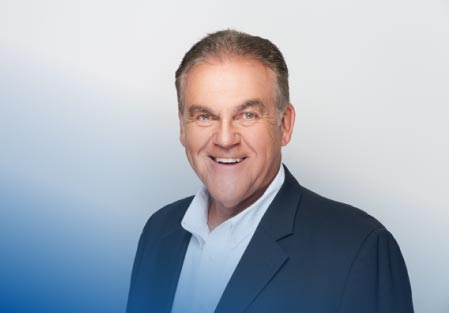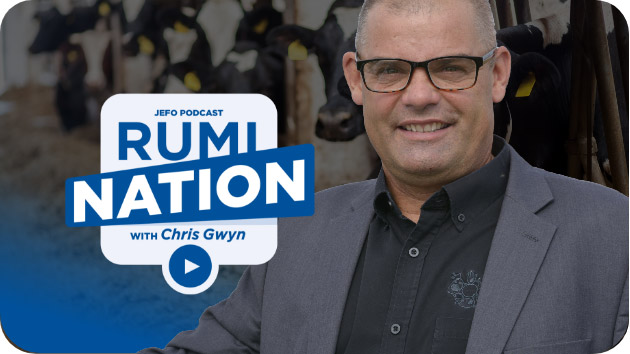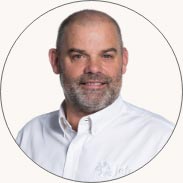RumiNation | S05 : E17
Jean Fontaine, Founder of JEFO, on Livestock Feed and Industry Evolution
Brought to you by Jefo Nutrition
Share now!
Did you enjoy this episode?
Share now!
Jean Fontaine, Founder of JEFO, on Livestock Feed and Industry Evolution
Jefo founder Jean Fontaine explores Jefo’s 40-year journey, emphasizing the need for openness to change, precision nutrition’s impact, and the value of building rich customer relationships.
Our guest - Jean Fontaine
Jean Fontaine is a renowned entrepreneur, holding a bachelor’s degree in agronomy from Laval University, an honorary doctorate from the University of Montreal, and the title of Commander of the Order of Agronomic Merit of Quebec. He is the founder of Jefo, a global leader in non-medicated animal nutrition. Established in 1982, the company exports to over 65 countries, and generates revenue exceeding $450 million.
Since early 2000s, Jefo has been providing precision nutrition solutions featuring the Jefo Matrix Technology, a protection that has been perfected over the years to ensure slow and targeted delivery of active ingredients throughout the gastrointestinal tractus.

Contact
Join the Rumination community
Timestamps & Summary
Chris Gwyn (02:05)
JEFO recently celebrated its 40th anniversary. Can you share with us and with the audience the story of how JEFO started?
Jean Fontaine
JEFO started very modestly. I was out of school, 25 years old, and I had a choice to declare bankruptcy or try something. And I had a vision to offer our industry different source of material, to be more competitive. And it started like that. The snowball effect started gradually with one or two products, then the other ones were added altogether. So, simple start, amazing development.
Chris Gwyn (02:49)
This started and centered our culture of “Life, made easier”. Can you share with us what inspired this mission and give a few examples of how you and your employees embody this statement?
Jean Fontaine
After meeting with some experts who guided us about establishing our motto “Life, made easier”, we realized that we make life easier for the buyer, and their supply chain, with our quite fair size inventory warehouses. Life made easier by sourcing with our expertise, we know what is a product that fits. And, with the efficacy. Then, life made easier for the truckers. We have a nice system of logistics, able to make quality pallets the way we ship our products. So, it’s life made easier for everybody in the chain of activity. […]
Chris Gwyn (04:44)
We’ve seen over the last few years the idea of artificial intelligence gaining interest across the world as the livestock industry keeps evolving rapidly. In your thoughts, what are the main producer challenges and market changes that you foresee and what will be the key attributes of those who successfully adapt to these changes?
Jean Fontaine
Farmers need to get access to their numbers and to have them handy to be able to know what’s going on rapidly and correct the situation. Before AI, it was not easy to take a note and then put all these things together. Today, there are more and more tools to do that. Some companies offer on-site, cameras, and sensors that can feel the water flow, the temperature, the ammonia level, and the behavior of animals. So, all this will bring precision and the farmers will know what’s going on. And sometimes we don’t realize they have a hell of a challenge in their life. Many factors must be controlled. So, to do that, AI will bring us tremendous capacity. And then you have to adapt to change. The future with AI will change the planet. […]
So, there’s no reason that people can object to this change of knowledge. IPhones have been around for 15 years. Can you imagine your life without an iPhone today? Try to figure out your life today with no portable phone and then no smartphone. We can talk to the vets before they get there. They can have an edge about what is going on.
Chris Gwyn (07:30)
I know for over 20 years, Jefo Nutrition has brought innovations to the livestock and poultry feed industry with this Jefo Matrix Technology. Why is it important to microencapsulate nutrients like coenzymes in animal nutrition?
Jean Fontaine
It was believed that the rumen of the cow would do everything for the cow. Initially, we discussed having some AD plus B vitamins be protected to escape the rumen. Maybe you leave like 10 or 15 percent in the rumen to nourish the bugs and to go bypass. […]
Today, we have discovered that very small quantities bypassing the rumen make a tremendous impact. From the expertise in ruminants, we went back to poultry and swine, and we discovered an amazing approach. And the concept for us is to prevent feeding the pathogens in the intestine of the cow, of the pig, of the poultry. And we have developed data on that aspect that is intriguing to a lot of people. Now we have the capacity to go after the rumen and after the stomach in monogastric. […]
Chris Gwyn (10:44)
Can you explain how we do that within the Jefo Matrix Technology?
Jean Fontaine
Our technology uses vegetables, 100% vegetable carrier, fats, which have high melting points. We have some specific formulations of carrier with fatty acids and triglycerides, that will allow it to be released in the small intestine. We know how to slow the lipase to have a delivery further down in the intestine. This is why we’re gaining so much momentum with the customers.
Chris Gwyn (15:08)
Often in meeting with clients, they express to me the admiration they have for the entrepreneurship and the visionary aspect that they see in you. In this area of a visionary in the field, what do you feel is your contribution to the world of dairy cows?
Jean Fontaine
The contribution is to bring precision to the intestine of the cow for nutrition. People have injected vitamins. People have done a lot of drenching the cows. It was all behaviors to compensate for the problem they have at calving. Our technology, to protect against rumen degradation, has allowed us to give them a solution which is much less demanding on staff. The first reason people will leave the farm, the young guys, is the problem of calving their cows. They never quit because they drive the tractor. They never quit because they pass the broom. They hate to grab the cow and drench her and all the other precautions because of calving issues. When the placenta doesn’t get out, they hate the smell of the barn and the cows suffer. If the placenta gets out with the calf a couple of hours later, as they do with our solution, we make their life easier. It’s another phrase that fits. It’s life made easier for calving problems. Our contribution is to give maybe more fun to the farmers solving their main problem of calving.
Chris Gwyn (17:02)
Could you share the key factors or strategies that contribute to the seamless integration of the family dynamics into a business and how you’ve worked to foster collaboration and harmony among family members while building this thriving business which is Jefo?
Jean Fontaine
I was so surprised to learn that 85% of companies die with their president. I was not conscious of that. Today, I’m lucky, out of seven kids, I have three who are old enough to be involved with us. Émilie, Jean Francois, and Anthony. I think I transmitted to them the passion for what I do. I retired 42 years ago. Now I play the role of the president of the company. I play the judge’s role; I play the father’s role. I am still an actor, but I play roles. Today, the kids realize it’s valuable. People respect and appreciate if you give your time for a purpose. To define the purpose of life, it’s a challenge. The first time I was asked the purpose of my life; I jammed the question. So, we have to find out our purpose in life and share that fun of helping others. If you are useful, you have a future. I teach my kids to be useful, to be passionate, to love people, to accept also to be their friends. So, I teach them: The more you give, the more you get; the more you give time, attention, help, and love, and you can talk about money as well. Whatever we can do for others won’t come back to us at a high speed. So today, for me, it’s a very big emotion to know that when I leave, people will do that. Success, if it’s only one life, is not success. Success is measured in time. So, I have many chances to be successful.
Chris Gwyn (19:09)
Could you share insights into how you strategically built and nurtured your professional network or circle of people who influenced you, advised you, and networked with you and what key principles or practices you believe contributed to the growth and sustainability of Jefo?
Jean Fontaine
It may sound easy to say, but we have the privilege to be in an industry where we have to be friends for a long time. If you sell me a house, I’ll buy my next one maybe 20 years from now. It won’t happen every month. In animal feed, we have to fill the pipe. So we need to talk to each other on a regular basis, weekly, monthly, quarterly. So we have a business of developing proximity and friendship. If you have proximity to people, you learn about their problems, their issues, and their challenges. Can we help them? Sometimes, yes, we can. This is making a rich relationship with the customer. And if the customer is happy, you have a good business. It’s a fruitful business and it can be contagious. They’re going to talk to others. I teach my staff to be lazy and I’ll define laziness: Do it right and make people talk about you. Your reputation will be your best future. You have to be useful to somebody. If you’re not useful, you’re going to be out with the game.
Chris Gwyn (20:48)
As we conclude, maybe a message that you can pass on to the next generation of entrepreneurs in the livestock and poultry feed industry. What would you share with them?
Jean Fontaine
Don’t believe the past will be the future. Whatever happened in the past without AI, without all these technologies, would not necessarily be proof for the future. We have to change. The world we are addressing is something invisible. So, we have to be open, and love change instead of avoiding it. Please be all excited by the change for the best. We are living in the best time for the human race. […]
We have to be hungry for change and not fear to adapt and progress together. And this is needed for everybody together. Not one guy, one company, one team. Everybody should be in the same kind of thinking pattern.






